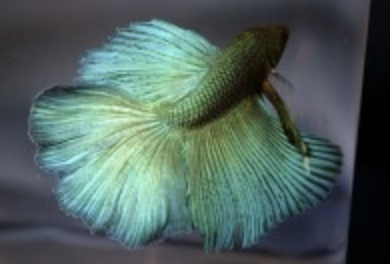 Image 1 of 1
Image 1 of 1


Betta - Koi (male)
Betta fish, also known as Siamese fighting fish, are popular freshwater fish known for their vibrant colors and flowing fins. Here are the requirements for keeping a Betta fish:
Aquarium size: Betta fish can be kept in relatively small aquariums, but it's important to provide them with adequate space. A minimum tank size of 5 gallons (19 liters) is recommended for a single Betta fish. The larger the tank, the better, as it allows for better water quality and swimming space.
Water parameters: Betta fish prefer warm water with a temperature range of 78-80°F (25-27°C). The pH level should be slightly acidic to neutral, around 6.5-7.5, and the water hardness should be within the range of 2-10 dGH. It is important to maintain stable water conditions to ensure the well-being of your Betta fish.
Tank setup: Provide a well-decorated tank with plenty of hiding spots and resting areas. Include live or artificial plants with broad leaves, as Betta fish like to rest on them and use them as cover. Avoid using sharp decorations or plastic plants that can tear their delicate fins. Bettas are known to breathe air from the water's surface, so make sure there is a small gap between the water level and the tank cover.
Filtration and water flow: Bettas prefer calm water with minimal water flow. A gentle filter or a sponge filter with adjustable flow is recommended to maintain water quality without creating strong currents. If using a filter, ensure that it doesn't create a significant disturbance on the water surface, as Bettas have labyrinth organs that allow them to breathe air.
Lighting: Betta fish don't have specific lighting requirements. Providing a natural light cycle with regular periods of light and darkness is sufficient. Avoid intense lighting that may cause stress to the fish.
Diet: Betta fish are carnivorous and require a high-protein diet. Feed them a varied diet of high-quality betta pellets or flakes as their staple food. Supplement their diet with frozen or live foods such as bloodworms, brine shrimp, or daphnia. Feed them small portions once or twice a day, taking care not to overfeed.
Tank mates: Betta fish are generally solitary and can be aggressive towards other fish, especially males. It is best to keep them alone in their own tank. However, if you wish to have tank mates, choose peaceful fish that are not known to nip at betta fins. Consider bottom-dwelling fish like Corydoras catfish or peaceful community fish like tetras, but monitor their behavior closely.
Betta fish, also known as Siamese fighting fish, are popular freshwater fish known for their vibrant colors and flowing fins. Here are the requirements for keeping a Betta fish:
Aquarium size: Betta fish can be kept in relatively small aquariums, but it's important to provide them with adequate space. A minimum tank size of 5 gallons (19 liters) is recommended for a single Betta fish. The larger the tank, the better, as it allows for better water quality and swimming space.
Water parameters: Betta fish prefer warm water with a temperature range of 78-80°F (25-27°C). The pH level should be slightly acidic to neutral, around 6.5-7.5, and the water hardness should be within the range of 2-10 dGH. It is important to maintain stable water conditions to ensure the well-being of your Betta fish.
Tank setup: Provide a well-decorated tank with plenty of hiding spots and resting areas. Include live or artificial plants with broad leaves, as Betta fish like to rest on them and use them as cover. Avoid using sharp decorations or plastic plants that can tear their delicate fins. Bettas are known to breathe air from the water's surface, so make sure there is a small gap between the water level and the tank cover.
Filtration and water flow: Bettas prefer calm water with minimal water flow. A gentle filter or a sponge filter with adjustable flow is recommended to maintain water quality without creating strong currents. If using a filter, ensure that it doesn't create a significant disturbance on the water surface, as Bettas have labyrinth organs that allow them to breathe air.
Lighting: Betta fish don't have specific lighting requirements. Providing a natural light cycle with regular periods of light and darkness is sufficient. Avoid intense lighting that may cause stress to the fish.
Diet: Betta fish are carnivorous and require a high-protein diet. Feed them a varied diet of high-quality betta pellets or flakes as their staple food. Supplement their diet with frozen or live foods such as bloodworms, brine shrimp, or daphnia. Feed them small portions once or twice a day, taking care not to overfeed.
Tank mates: Betta fish are generally solitary and can be aggressive towards other fish, especially males. It is best to keep them alone in their own tank. However, if you wish to have tank mates, choose peaceful fish that are not known to nip at betta fins. Consider bottom-dwelling fish like Corydoras catfish or peaceful community fish like tetras, but monitor their behavior closely.








